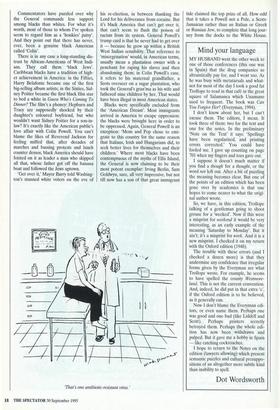Mind your language
MY HUSBAND went the other week to one of those conferences (this one was in Spain) that the drug companies so altruistically pay for, and I went too. As he was busy with metatarsals and what- not for most of the day I took a good fat Trollope to read in that café in the great square of Salamanca which Unamuno used to frequent. The book was Can You Forgive Her? (Everyman, 1994).
I don't know about her, but I can't excuse them. The editors, I mean. It took three of them: two for the text and one for the notes. In the preliminary `Note on the Text' it says: 'Spellings have been regularised, and printing errors corrected.' You could have fooled me. I gave up counting on page 701 when my fingers and toes gave out.
I suppose it doesn't much matter if you find a though for a thought, or the word not left out. After a bit of puzzling the meaning becomes clear. But one of the points of an edition which has been gone over by academics is that one hopes to come nearer to what the origi- nal author wrote.
So, we have, in this edition, Trollope talking of a gentleman going to shoot grouse for a 'weeked'. Now if this were a misprint for weekend it would be very interesting, as an early example of the meaning 'Saturday to Monday'. But it ain't; it's a misprint for week. And it is a new misprint. I checked it on my return with the Oxford edition (1948).
The trouble with these errors (and I checked a dozen more) is that they undermine any confidence that irregular forms given by the Everyman are what Trollope wrote. For example, he seems to have spelled the county Westmore- land. This is not the current convention. And, indeed, he did put in that extra `e', if the Oxford edition is to be believed, as it generally can.
Now I don't blame the Everyman edi- tors, or even name them. Perhaps one was good and one bad (like Liddell and Scott). Perhaps printers secretly betrayed them. Perhaps the whole edi- tion has now been withdrawn and pulped. But it gave me a hobby in Spain — like catching cockroaches.
I hope to return to the Notes on the edition (lawyers allowing) which present semantic puzzles and cultural presuppo- sitions of an altogether more subtle kind than inability to spell.
Dot Wordsworth


































































 Previous page
Previous page